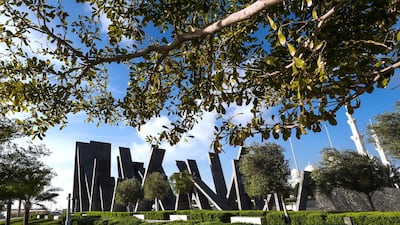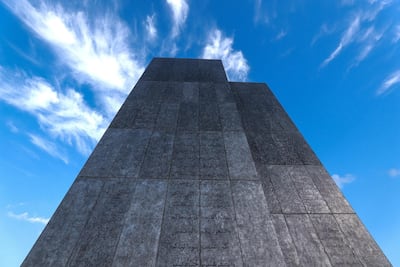Abu Dhabi’s Wahat Al Karama is known in English as the Oasis of Dignity – and it is breathtaking in every sense.
From a glittering pool specifically built to reflect the Sheikh Zayed Grand Mosque, to 31 imposing aluminium slabs leaning against each other, Wahat Al Karama is an awe-inspiring site.
But its smallest details impress most.

It was built in only seven months and inaugurated on November 30, 2016 – the same date that the UAE lost its first soldier in 1971, in the battle of Greater Tunb against the Iranians.
The 46,000 square metre site opposite the Sheikh Zayed Grand Mosque commemorates those who government has named its heroes. The many commuters who pass by the site might not be able to see the poems engraved on the leaning slabs of aluminium, or the narrow, horizontal structure supporting these slabs, engraved with the pledge of the UAE.
The smallest detail at Wahat Al Karama is symbolic, from its name and design, which was chosen to reflect the heritage of the UAE, to a small stream of water that travels through the different “stations” and “pavilions” symbolising the UAE’s first irrigation system.
The spine supporting the slabs is meant to represent the UAE’s soldiers, those who hold the country together. Without them the nation would topple.
Names of the heroes are not on the slabs but engraved on book-sized panels made of melted-down tank armour in the Pavilion of Honour.
The panels are set in the walls of a circular enclosure with even more leaning slabs. These are made of glass and there are eight of them – one for each of the emirates, and an eighth representing the servicemen and women.
Each panel has the name of the soldier engraved, and the year and country where they died.
Most recently, there are those who have lost their lives in Yemen and Afghanistan. There is only one woman – Sgt Mahra Mohamed Al Zaabi – who died in 2004 in the UAE during military training.
So particular is the attention to detail that the enclosure has a 24-hour cooling system so that the panels do not fog over with the UAE’s humidity. Water swirls anti-clockwise in a small infinity pool a few metres before the pavilion.
The pool is symbolic on two levels. One shows the soldiers’ sacrifices are kept in the history of the UAE; the other that their comrades will carry on their work.
__________
Read more:
Saudi and UAE are taking action to protect Yemen civilians, Mike Pompeo says
Mukalla: The Yemeni city that defeated Al Qaeda and now needs the world's help
UN Yemen envoy to visit Sanaa, Riyadh and Muscat after Geneva talks setback
Yemen pro-government forces cut major Houthi supply route
__________
Every day, whether rain or shine, a dozen servicemen in uniform visit Wahat Al Karama to salute the UAE’s heroes.
On official visits and special occasions, the centre pool is drained and a wreath is placed on the aluminium panels.
Thousands of people visit Wahat Al Karama each day and the amphitheatre can host 1,200 people, but again, Wahat Al Karama’s grandeur lies in the small details – in the olive and palm trees planted to show heritage and love, and in the bushes grown to attract birds so that the only sounds you hear are of water streams and bird song.
It is, as the museum’s guide reads, “a timeless tribute to commemorate and honour the Emirati heroes who sacrificed their lives in the service of the country”.
Ceremonies to mark Commemoration Day will be held by ministries and institutions across the country tomorrow. The UAE flag will be raised at half-mast at 8am. A minute of silence will be held at 11.30am, followed by the raising of the UAE flag and the national anthem to honour Emiratis who have died in the line of duty.


